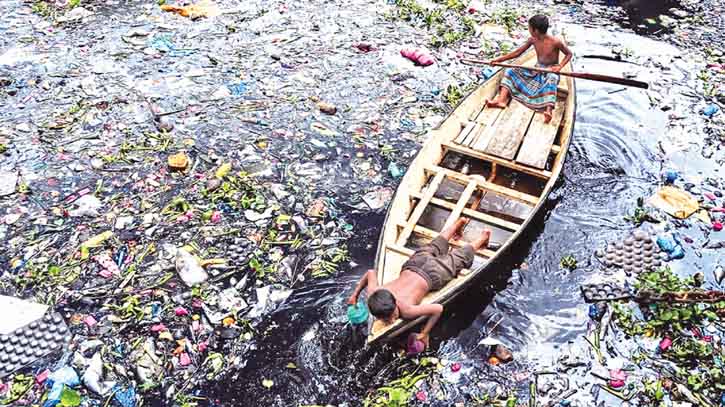
Photo: Collected
For 20 years, Boatman Hossain operated a boat on the Buriganga. He stated that fish had previously been visible while I had operated the boat and that the river's water was now also shiny. But because of pollution, the water has now turned black with odor, and the fish are no longer visible.
Like Hossain, the lives and livelihoods of many people in our country revolve around this river. This river is the source of living organisms, and various rivers suffer from pollution due to a variety of causes.
Buriganga River in the capital, is a real-life example of river pollution. Around this river that flows beside the capitals, numerous factories, orchards, markets, and hotels establishments have been constructed whose sewage is dumped into the Buriganga. Additionally, domestic waste is dumped into the Buriganga River, contaminating its water.
Rows of fruit and raw vegetable stalls can be seen in the capitals Shyambazar, Farashganj, and Badamtali neighborhoods. On the river banks, these wastes can be seen. At WASA, the garbage has accumulated and clogged the water drainage system. River water contains rotting tomatoes, onion and garlic peels, dead animals, banana leaves, and other vegetables. Due to the rotting debris, these wastes that have gathered on the river banks for a long period are emitting a foul smell.
Due to family business, Seyam Islam, a 20-year-old teenager, frequently had to cross Buriganga to get to Keraniganj, which is on the opposite side of the river.
According to Siam Islam, the waste piles on the river’s banks emit an intolerable stink. He claimed that pollution was the reason the river’s water had turned black.
When administered, this water frequently irritates. Additionally, the stench gets harder to stomach as the river's water level drops.
The wholesale garbage, hotel garbage, and domestic garbage that are routinely dumped on both banks of the river are contaminating the Buriganga and spreading an unpleasant odor by mingling with rainwater. With the exception of the monsoon season, the Buriganga constantly emits a foul odor, and its water is so filthy that it appears completely black. The water in Buringaga is exactly as contaminated as it was at other times of the year save for the monsoon, despite the fact that there has been less rain this year due to climate change.
Keraniganj resident Shoena Akhter studied at Jagannath University. In order to attend the university, she frequently has to cross the Buriganga. She attributed the smell to the waste that people on both sides of the river had thrown into it. She stated that the markets constructed along the river lacked a sufficient method for disposing of trash. These wastes are thrown on the river's banks, where they later interact with the water.
The proprietors of the established on the bank of Buriganga, though, insist that they don't dump trash in the river.
Mohammad Salim, the general secretary of Shyambazar Arat Malik Samity, asserted that it is the launch garbage, not the Arat, that is contaminating the Buriganga. We pick up the trash from our yard, and the city corporation people come and take the trash from here," he stated. Each shop has given instructions on how to handle its own waste and where to dispose of it.
This is our well-established business. None of us contaminate the river. The owners of the launches contaminate the river with launch waste.
TDM/MI








